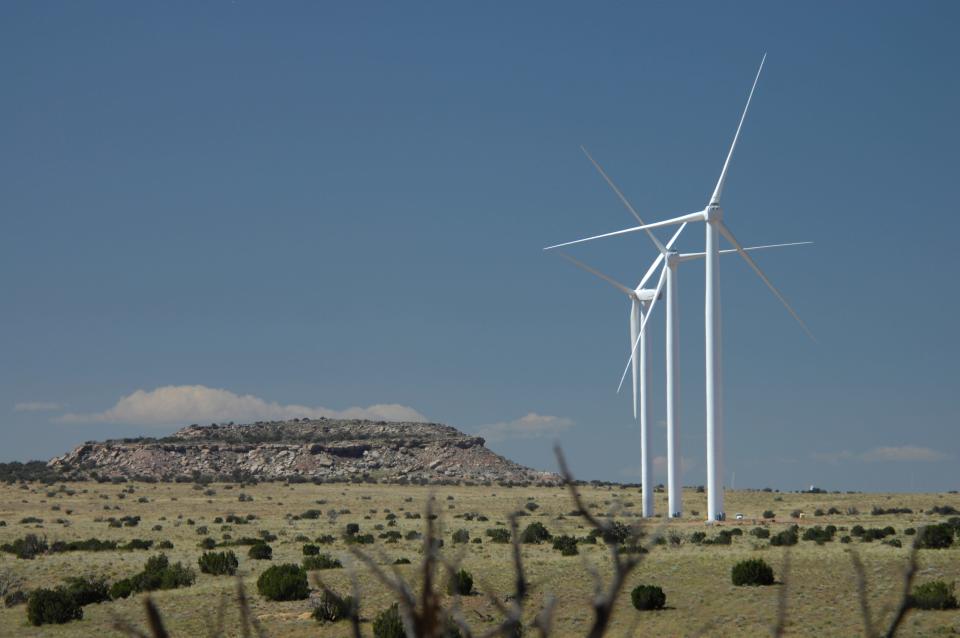Temperature and power use records could topple, but utilities say they are prepared for heat
Power utilities Salt River Project and Arizona Public Service report no service disruptions and say they're prepared for more heat.
Temperatures have reached 110 degrees or more for 11 straight days around metro Phoenix, with more hot weather in store. The National Weather Service forecasts temperatures possibly pushing 120 degrees this coming weekend.
"This is what we plan for — it's the core of what we do," said Justin Joiner, APS vice president of resource management. "Making sure the energy is there when customers need it."
He said the Phoenix-based utility is experiencing no unusual problems amid July's heat wave — an assessment echoed by Pam Syrjala,'s SRP's director of supply, trading and fuels.
“There’s nothing terribly unusual” about the hot temperatures or power demand of late, she said. "I’m not worried about it.”
Temperature, power-use records could fall

Still, some notable power-use and heat records could be broken this week or next.
SRP expects to set a new peak for energy use sometime this summer at around 7747 megawatts, Syrjala said. If so, that would handily eclipse the prior record of 7620 megawatts achieved last year, representing an increase of about 1.7% over the old record.
One megawatt is roughly the electricity needed to power 225 average-sized homes.
The Phoenix area's rising energy needs reflect not just the current heat wave but also more people moving into the region, rising employment and increased manufacturing and commercial activity.
Joiner said another record could be shattered: the number of days in the region when the thermometer hits 110 degrees or more. The streak is 18 consecutive days, set in 1974, he said, with 11 straight days so far this year.
Both utilities say they're using a broad mix of fuel to generate electricity during peak demand periods, including that derived from natural gas, coal, nuclear power and, increasingly, renewable sources including solar.
"Every tool in the tool kit is being used right now," Joiner said.
How customers can cut energy use, save money
Both major power utilities encourage residential and business customers to economize and use energy efficiently, partly to save money and partly to ease pressures on the grid.
For example, both SRP and APS offer voluntary programs (called "Bring Your Own Thermostat" and "Cool Rewards," respectively), where customers can use smart thermostats and adjust them, or allow them to be adjusted automatically, during peak energy-use periods for more efficient cooling.
For example, a thermostat might be a lowered a few degrees a couple of hours earlier than normal so that the thermostat then could be raised during peak times later in the afternoon or early evening. Customers can opt out when needed.
Among other energy-saving tips, SRP recommends setting your thermostat to between 78 and 80 degrees during the day while at home and several degrees higher at night or when you're away. For every degree above 80, a customer can lower electricity costs by 3%.
Also, consider closing drapes and blinds, as windows can account for nearly 50% of the heat entering a home.
Similarly, replace disposable air filters regularly to ease the strain on air conditioners. Also, use ceiling fans where possible, but turn them off when you're not in a room. Permanent air conditioner filters should be washed monthly.
Keeping utility accounts in good standing
In addition, pay attention to monthy energy bills and reach out to your utility if you're having trouble paying them.
Regulated electric utilities, including APS, are not allowed to disconnect customers during periods of extreme hot weather owing to late payment, nonpayment or accumulated debts. Commissioner Lea Márquez Peterson of the Arizona Corporation Commission sent a reminder notice last week. She urged customers with payment problems to contact their utilities to learn about disconnect policies and about various assistance programs, rather than ignoring the problem.
"APS maintains a seasonal hold on disconnects for non-payment, meaning from June 1 through Oct. 15 we do not shut off power for past-due accounts," said Yessica del Rincon, a spokeswoman for the utility, in an email. "We also waive late fees during this period."
SRP waives disconnect procedures during periods like now, when the National Weather Service has issued excessive heat warnings, Syrjala said. She, too, encouraged customers facing payment problems to contact the utility.
Reach the writer at russ.wiles@arizonarepublic.com.
This article originally appeared on Arizona Republic: Arizona utilities APS, SRP say they are prepared for extreme heat

